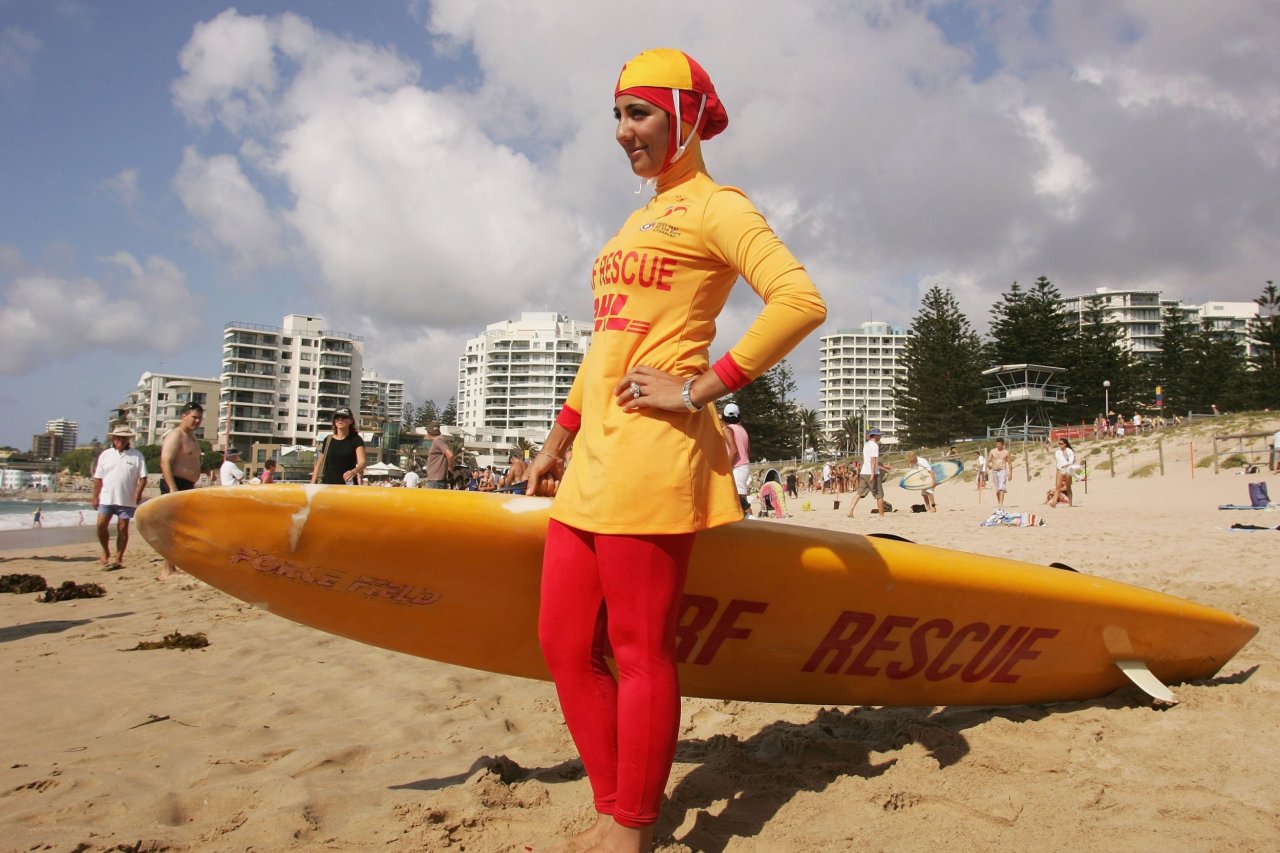Ah, summer…long days, blistering heat, cool dips in the pool.
And the burkini.
Yes, the burkini—a portmanteau for burqa, a robe-like garment popular with some Muslim women, and bikini, a two-piece bathing suit that made its debut 70 years ago at the fashionable Parisian lido Molitor.
Like its predecessor, the burkini is a two-piece swimsuit for women. But unlike the bikini, which scandalized for showing too much skin when it first appeared in 1946, the burkini consists of a long-sleeve top and full-length pants that cover the entire body, except for the hands, face and feet. (Women also have the option of concealing their hair with a covering redolent of a nun's headpiece, creating the look of a wetsuit with a hoodie.)
While the skin quotient of the two swimsuits could not be at further ends of the spectrum, both let women decide just how much skin they want to show at the pool or beach. And the introductions of both suits, although during different centuries, have been met with similarly strong reactions: fury, derision and international bans.
Yet the burkini, like its once-scandalous cousin, is fast gaining traction with a wide cross-section of women—not just Muslims but also women of other religious faiths, as well as those who simply wish to avoid a sunburn or not be ogled by passersby.
British retailer Marks & Spencer, which this year went mainstream with a line of burkinis in two shades—blue and black—tells Newsweek it's already out of stock. "This is the first time we're offering burkinis in the U.K., as well as globally on our website, and they're already sold out," says spokeswoman Emily Dimmock. She says the retailer is now selling them "in many of the 58 countries in which we operate, including the Middle East, China and Hong Kong."
Bans, Outrage
The rising popularity of the burkini, however, hasn't stopped many from strenuously objecting on grounds ranging from the violation of personal freedom to social irresponsibility to hygiene concerns.
In early July, the Austrian town of Hainfeld was the latest to ban the burkini at its public pool. Peter Terzer, a town councillor and member of Austria's anti-immigrant and anti-Muslim Freedom Party, issued a statement saying he was "completely pleased" with the ban, as the burkini does not meet rules for acceptable swim attire and is "unsanitary." This would have been hard to believe, had it not already happened in June, when the German town of Neutraubling in Bavaria imposed a similar ban on burkinis, also citing hygiene fears and putting up signs stating that the use of its public pool is "only allowed in usual swimming costumes."
The mayors of both towns vociferously defended the bans, citing complaints from swimmers and fears that burkinis in the pool area might somehow taint the waters. Neutraubling's Christian Social Union mayor, Heinz Kiechle, went so far as to say wearing a burkini, "for me, is incomprehensible."
Burkinis have also been banned in parts of France, Italy and Morocco, with the wearers subject to hundreds of dollars in fines. Shabana Mir, a London-born Muslim who teaches cultural anthropology at American Islamic College in Chicago, says she finds the argument over hygiene laughable, since burkinis are made from ordinary swimsuit fabrics and cover most of the body, which would presumably reduce direct contact with the water and other swimmers. She noted in an online piece, "The Deadly Burkini, or, What Exactly Is an 'Islamic Swimsuit'?" that "it's extremely unfair and sexist to require women to dress in such attire" as bikinis or one-piece suits if it leaves them feeling overly exposed.
The burkini crackdowns echo the arduous path of the bikini, initially banned along the French coastline, as well as in Italy, Belgium, Spain, Portugal, Australia and parts of the U.S., and finally denounced by Pope Pius XII in the 1950s as sinful when the first Miss World winner was crowned in her bikini (which never happened again in the pageant).
This summer, just as burkinis hit stores, France's women's rights minister, Laurence Rossignol, condemned retailers such as M&S and high-end labels such as New York's DKNY and Italy's Dolce & Gabbana for offering full-coverage swimsuits and glamorous head-to-toe Islamic haute couture to women. She said the garments are not "socially responsible" and promote "the shutting away of women's bodies."
When the interviewer pointed out that certain women choose to keep themselves covered up, she replied, "Of course, they are women who make the choice," but then she likened Muslims wearing burkinis to "American negroes who were in favor of slavery." The minister's remarks touched off protests, demands for her resignation and a Change.org petition asking that she be publicly censured. Rossignol later apologized for use of the word "negro" but has maintained her position.
It is highly unlikely the political grandstanding will have much effect, because—boom!—math. Islamic fashion is now one of haute couture's hottest niches, with spending on clothing and footwear by Muslims expected to skyrocket an estimated 82 percent from 2013 to 2019, reaching $484 billion, according to Thomson Reuters and New York researcher DinarStandard.
Mir, who does not wear a burkini—instead favoring something more akin to a feminine surf suit—takes issue with the idea that a Muslim wearing a burkini is any different from a nun wearing a habit or a woman wearing high heels. With the exception of cases where women might be forced to wear Islamic garb against their will (which she emphasizes is very un-Islamic), it's all about personal choice, she says. "I have to go to work wearing this uncomfortable clothing, but it's our culture!" she says, adding that she grew up wearing a burqa but now wears typical business attire to work, like many Americans. "Somebody else wears high heels—they embrace it. It's uncomfortable. It's painful. It's expensive…. People can easily see it as offensive and oppressive, but some people choose to wear it. I am an anthropologist, so I see this as: We are all restricted, and we are all free. To say the burkini limits a woman's freedom is to forget that freedom is, first and foremost, about choice."
'I Got Orders Right Away'
Is it possible that the burkini embodies a loss of freedom? Newsweek caught up with the inventor of the burkini to find out.
Aheda Zanetti, a 48-year-old Lebanese Muslim woman who lives in Bankstown, Australia, near Sydney, says she began working on designs for the burkini after watching her 11-year-old niece struggling to play sports in a long, flowing hijab, or head scarf. "She looked like a tomato, her face was so red wearing all that clothing," she recalls.
She searched for Muslim swimsuits and sportswear online and found nothing. "When I thought back, I realized that we didn't really swim or play sports when I was growing up, not because we didn't want to but because we just didn't have the clothing!" she says. "So we never really enjoyed the summer life, the sports lifestyle that Australia has to offer."
She launched her burkini company, Ahiida Burqini Swimwear, 12 years ago. "It went bang. It did so well, I got orders right away," she says. "People went absolutely crazy. I wasn't prepared for it. Now we have sales all over the world, and whenever they ban it—like when they did in Morocco—it goes very well for me. People just buy more of them."
Zanetti, a married mother of three, says she and her two teen daughters all wear burkinis, but she notes 35 to 45 percent of her market is non-Muslim. "I have a lot of people who like them because they want the UV protection or prefer to cover more of themselves," she says. "Not all of us like to be naked. As for Muslims, wearing comfortable and flexible clothing for us is not something we are used to! Now we have Muslim women competing in swimming and marathons and becoming a lot more confident. I used to say, 'It's just a swimsuit for goodness sake!' but that's not true. It was confidence."
That said, Zanetti has detractors. "One Italian man wrote to me to say, 'I enjoy watching women in a bikini—why are you doing this to us?' And I wrote back, 'Use your imagination!'"



















